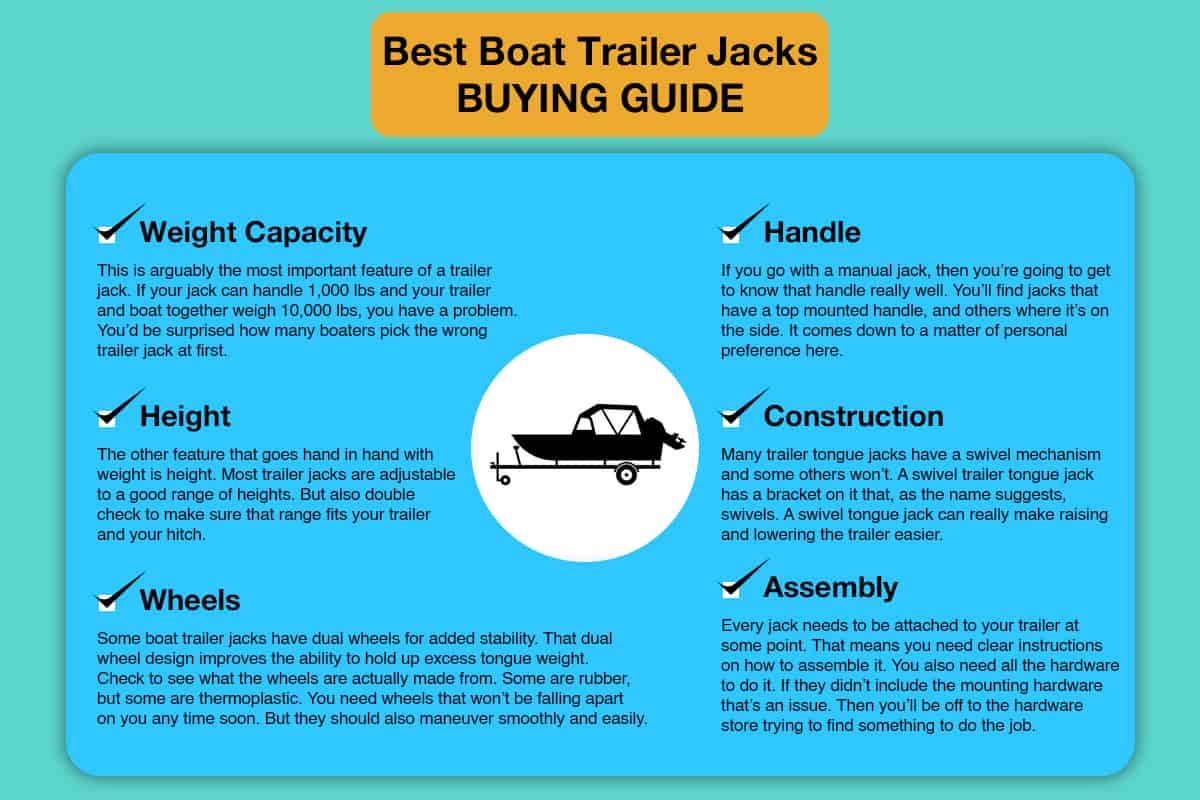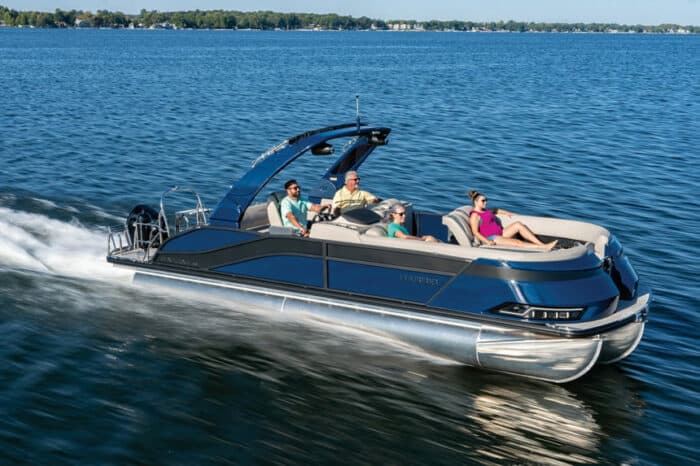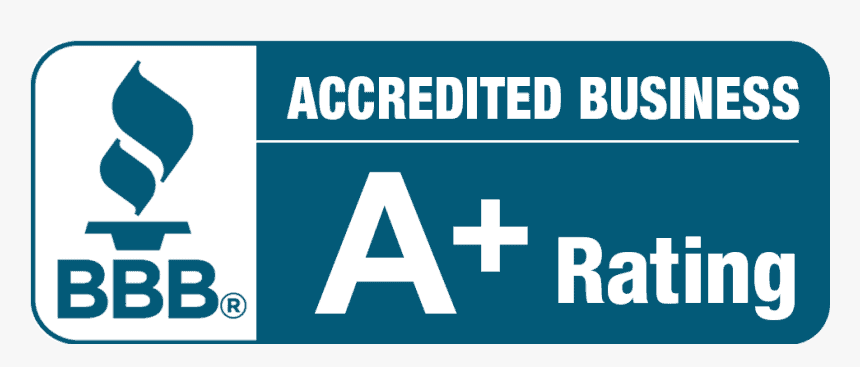8 Best Boat Trailer Jacks for 2024
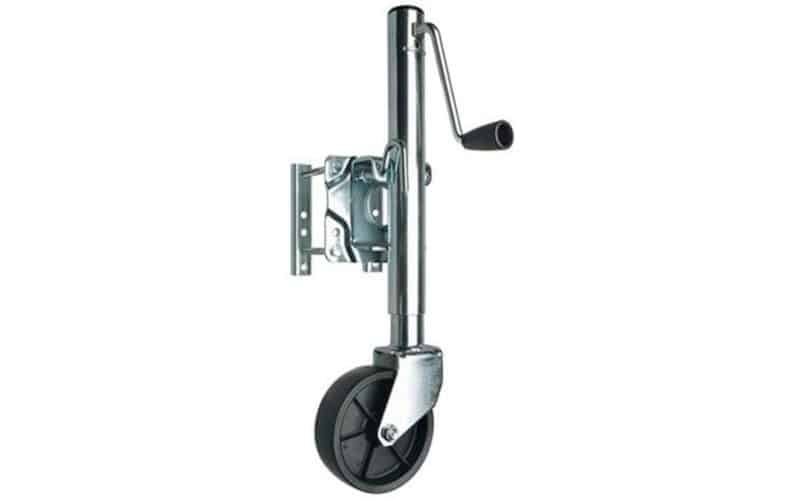
Reese Towpower 74410 Trailer Jack
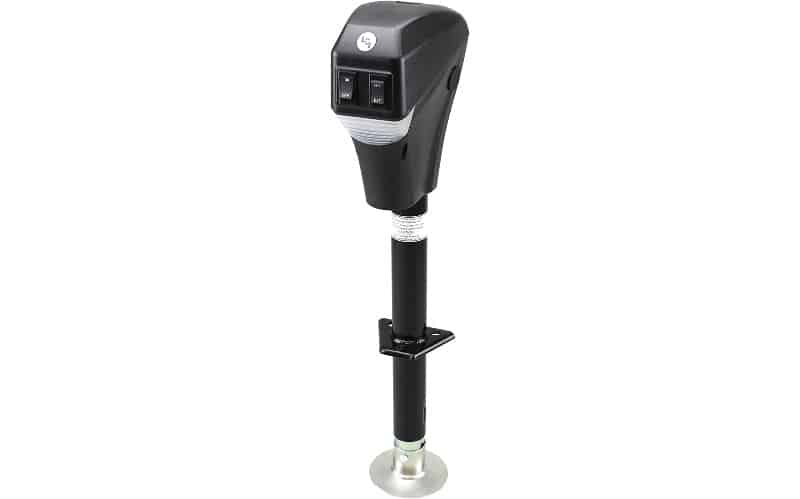
Lippert Power Tongue Jack
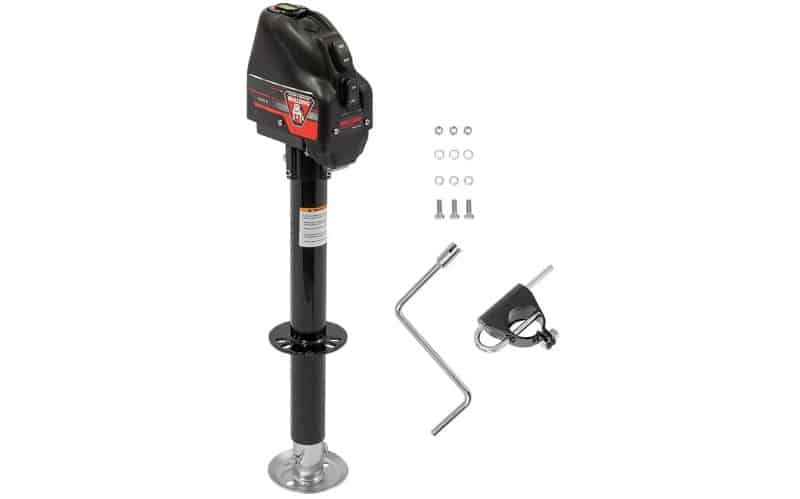
Bulldog A Frame Power Jack
A boat trailer jack is often overlooked when it comes to boating. Heck, even boat trailers are often secondary considerations. But lifting that trailer up has to be done somehow. Not all boat trailer jacks are created equal. If you want an effective but also safe and easy to use boat trailer jack, it takes some hunting. You need to know if a swivel tongue jack is different from a boat trailer wheel jack. Is all the mounting hardware included? What’s the maximum lift capacity? Is there a pull pin release? Let’s check out the best boat trailer jacks on the market.
Reese Towpower 74410 Trailer Jack

If you want a simple and quick manual jack, Reese has you covered. This is the best boat trailer jack for the money. There are no bells and whistles on this model, but it works great. The side cranking handle is easy to grip and feels comfortable in your hand. The mounting style means it’s easy to crank and shouldn’t cause too much undo stress. The gear ratio is 1:1, so it moves pretty quickly as you crank, too.
The jack is made from steel with a zinc coating. That ensures strength and a good amount of resistance to corrosion. It can easily be attached to the frame when you’re done to keep it out of the way.
The weight capacity for the Reese is 1,000 pounds. Remember, you want to look for a capacity that’s somewhere between 10% and 15% of the overall weight of your trailer. That’s with the boat combined. We think it’s best to overshoot the mark and be cautious, so lean into that 15%. That means this is ideal for handling about 6600 lbs. But again, you could push that a little. In any event, a small or medium boat could be handled well here.
The bracket is swivel mounted. That means it can move out of the way quickly and easily when you don’t need it. It’s also set up to handle a variety of frame types. Mounting this on almost any trailer should be easy. It’s designed for tongue frames that are between 3 inches and 5 inches.
Reese includes all mounting hardware in the kit. One thing to watch out for is that the bolts are a little long. Depending on the size of your frame, they can stick out a good distance. And even when everything is secured in place, it does have a tiny wobble that can be concerning. You may find yourself tightening things more often than you’d plan just to be cautious. Also, make sure you check lubrication before use. It doesn’t come with a lot in the mechanism already.
Lippert Power Tongue Jack

There’s a reason the Lippert power jack is the best seller on Amazon. This is a powerful, reliable machine at a good price for what it can do. The weight capacity on the Lippert is a whopping 3,500 lbs. If you’ve never tried an electric trailer jack before, start with this one. It’s likely you won’t ever want to use another one.
The features this jack offers are impressive. Installation hardware is included, and the set up is really quick and simple. Once installed, it’s push button operation to make raising and lowering your trailer a breeze. And, in the event something goes wrong, there’s still a manual option.
LED lighting helps ensure you see exactly what you’re doing, even in poor light conditions. The four lights illuminate the coupler and hitch ball so you can line them up even at night.
The motor is an 18 stroke, 12V, 30 amp powerhouse. It’s strong, quick, and pretty quiet as well. The metal parts are steel and it’s in a tough housing to prevent damage from the elements. We recommend buying a cover for it just in case, though.
You may want to watch out when it comes to fully retracting the jack. There does come a point where it starts making a very noticeable sound that may make you panic. But it only happens when it’s fully extended and may just be a warning that you reached the end of the line. The first time you hear it is pretty jarring, though.
If something does go wrong, Lippert does have a limited one year warranty on the jack.
Bulldog A Frame Power Jack

If you want a monster of a boat trailer jack, this is your best bet. The Bulldog trailer jack is an absolute powerhouse. With a weight capacity of 4,000 lbs, this can handle some serious boats with ease. From a bass boat to a yacht, this has you covered.
The jack can give you 22 inches of lift with the push of a button. There’s 14” of travel and an 8” drop leg as well. That ensures getting in and out is pretty easy overall. There’s a spring loaded drop leg pull pin, and a single axis level. You’ll be steady and secure with this in no time.
Like any good quality electric jack, this has a manual override. A trio of LED lights ensure you have a good view of the hitch and coupler any time of day. . It’s premium quality and it definitely comes at a premium price. To ensure you can rely on the quality here, Bulldog also offers a solid 5-year limited warranty. That’s one of the best in the business.
Fulton Dual Wheel Boat Jack
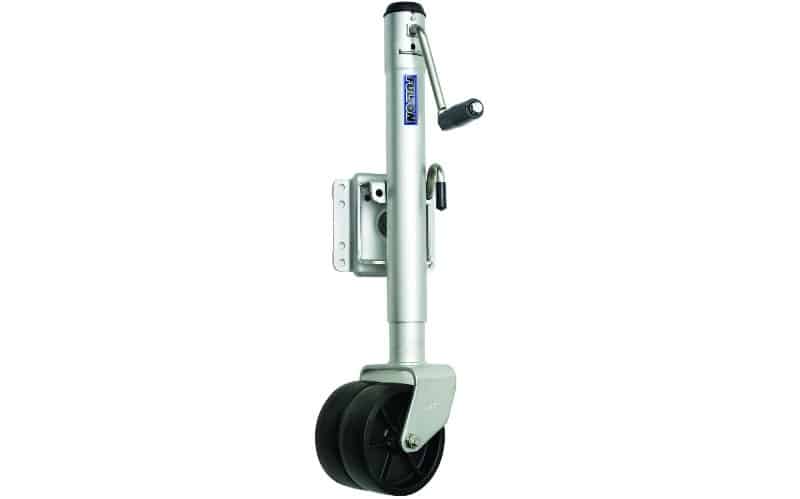
If you need more strength and stability than some of the cheaper manual jacks, try Fulton. With a weight capacity of 1500 lbs, this is a tough little jack. The dual wheel design ensures it can handle a larger weight while also moving it smoothly. If it’s never not running smoothly, getting them lubricated again is a breeze.
Because this is a two wheel design, you’ll notice getting your trailer adjusted is a lot easier. That second wheel takes much of the stress out of fine tuning your movements. Getting the trailer in place and then moving it around is extremely smooth and simple. However, turning becomes a little harder with two wheels. If you need to spin the trailer around, it will take longer with this design versus a single wheel.
It comes with dual 6 inch wheels and a ½ inch swivel pull pin. It is constructed from alloy steels and coated to protect from corrosion.
Retracted length is 13” and it extends to a full 25”. That means you should have no problem getting this in place and hooking up your trailer.
Fulton is known for top quality products. To that end, they also offer a 5-year limited warranty on their trailer jack. You’re not likely to find a better warranty out there. Many only offer one year. That’s a definite plus for this model.
For a manual jack, this is a pricey one. It’s actually about 2 or 3 times the price of some similar models. But don’t feel that you’re not getting value here. This really is a solid manual jack. And that warranty speaks volumes about the quality. Still, when there are other jacks at half the price, it can seem a little extreme. Just remember that Fulton quality is widely known in the industry.
Fulton Bolt On Trailer Tongue Jack
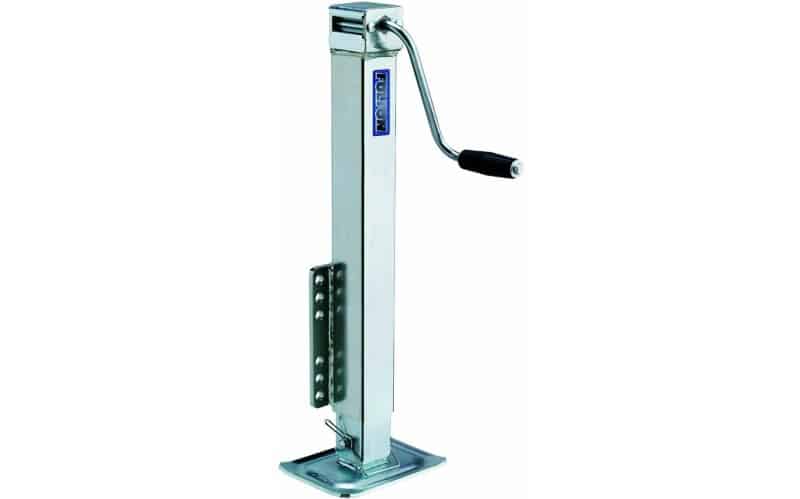
If you’re looking to play with the big boys, then Fulton knows what you need. Their bolt on trailer tongue jack can handle a truly massive 5000lbs. The drop leg has a wide 6 inch by 8 inch foot plate for maximum stability and power. It’s on;y 6.5 inches when retracted but then extends to a full 35 inches. You also get 18.5 inches of clearance and 28 inches of travel.
The jack is made from alloy steel. The same high quality zinc finish that Fulton uses on all their jacks prevents corrosion. With a 5-year warranty, you can expect this powerful trailer jack to work well for a long time. One thing to remember is that a Fulton warranty does not cover resale. So if you bought this second hand, the warranty would be voided. It’s for original owners only.
The grease fitting is easy to access. That means keeping this lubricated won’t be an issue. The side crank is easy to use. The handle is a good size and feels comfortable in your grip.
Installation is very easy. Bolt it onto the frame in minutes and you’re good to go. Mounting hardware is good for a 4 inch frame up to a 6 inch frame. If you need smaller, Fulton does have a model rated for 2500 lbs rather than 5,000. Just make sure you don’t mix them up by accident.
SuperHandy Power Trailer Tongue Jack
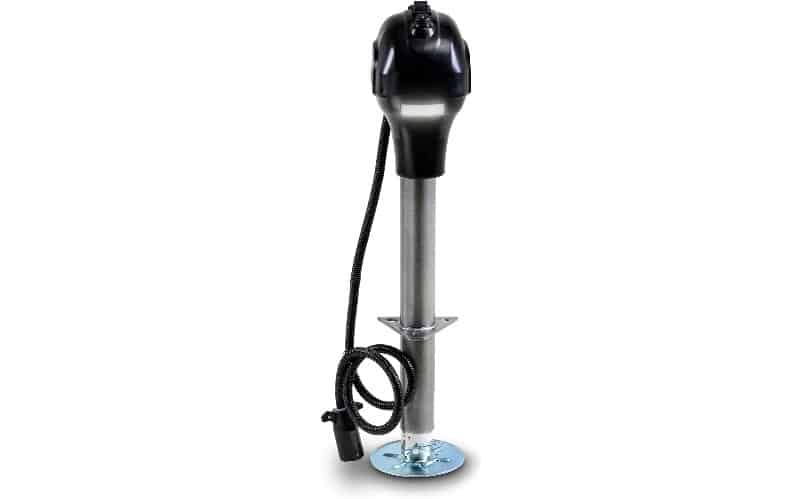
If you want some serious height, the SuperHandy electric trailer jack is a good option. The retracted height is 29 ¼ inches. That’s pretty high already. Fully extended, you’d got a height of 52 ¾ inches. As you can see, this is not for any tiny trailer. The 3500 lb weight capacity drives that point home. This is for some big trailers.
With a 12V battery and a 14 amp circuit breaker, this gives you reliable power. The gears are high-quality steel. Expect that they’re going to give you a good, long lifespan. Like most electric jacks, there’s also a built-in LED light. If you’ve ever tried using a manual jack in the dark, you start to appreciate these lights.
In case of emergency or loss of power, there’s a detachable hand crank. With a 6 inch footpad you have a durable, stable, and solid base. The unit bolts on with a simple three bolt process. Installation is easy and won’t take long.
Some of the more recent reviews on Amazon mention issues with wiring. It comes with a seven pin connector and it seems like newer versions may actually be wired backwards. This may be an issue with a specific vendor though, it’s hard to say. Many users are also using this for camping trailers as well, so how it’s being used may also affect how it works.
Lippert Quick Drop Tongue Jack
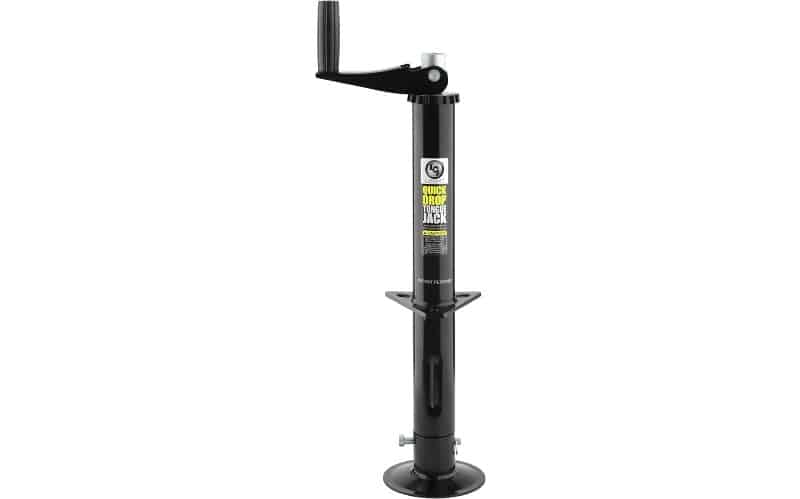
Sometimes it’s hard to find a quality mid-range trailer jack. Many manual jacks can lift about 1,000 lbs. Many of the electric jacks are good for 3500 lbs or more. What about if you want something int he middle? The Lippert Quick Drop is designed for 2,000 lbs.
Unlike most other designs, this one is a top wind. That can be a problem sometimes with manual cranking. The space and effort are not always ideal. It tends to be a little more exhausting to use this style. But Lippert has a very handy and ingenious solution. You’ll see in the center of that handle a ¾” hex nut. Attach a power drill to the hex nut and you don’t need to crank this by hand at all. Let the drill do all the work for you. It’s like a bridge between electric and manual cranking. Obviously you can still crank it by hand, but if you’re not looking to wire up an electric jack, try it out.
One thing you need to be aware of is that this is designed for a standard power drill. Do not use an impact drill. You’ll need to have your own drill and ¾” head to get the job done, but it’s a real time saver. This would have ranked higher on our list, but the thing that makes it so great is also its biggest drawback. If you hit that nut too hard with your drill, it’s going to get destroyed. Lippert needs to invest in a nut that is made to withstand high power drills. If they did that, this would be our top choice. But until this, it’s a good option as long as your drill isn’t too much for the nut to handle. If it is, it could destroy the nut and render the whole thing useless.
The steel construction is coated to prevent rust. It offers 14” of vertical range. It’s pretty reliable for most A-frame style trailers. Plus, now, you don’t need to worry about wiring the electric jack or parking near a power source. That’s pretty handy.
Installation is simple, and the hardware is all included. It’s a standard three bolt pattern, so nothing weird here. The footpad is removable with a pin.
Pro Series SideWind Swivel Jack
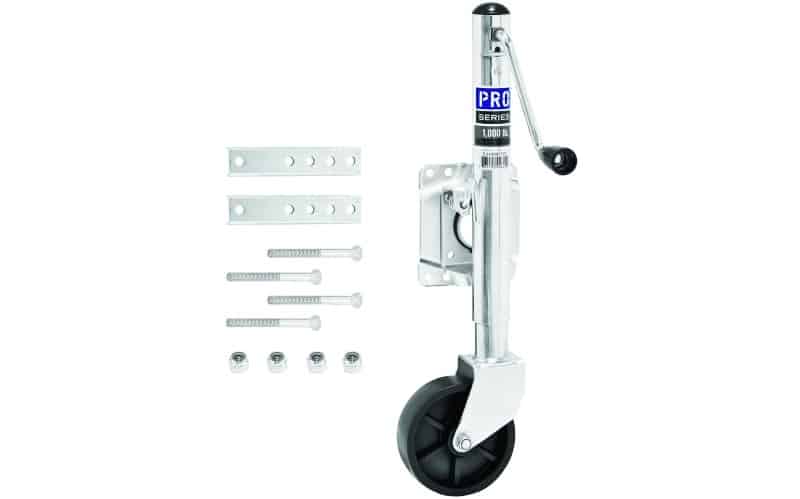
At 1,000 lbs weight capacity, this bolt on swivel jack is ideal for smaller boats. The price is very reasonable, and the construction is solid. Heavy duty steel with a zinc coating means it can handle some corrosion, and it’s tough. It’s designed to be mounted on a 3” to 5” trailer frame.
The side mounted cranked makes raising and lowering your trailer much easier. The handle is a little small, but it’s solid and comfortable in your grip. All the mounting hardware is included and installation is very straightforward.
Retracted, the jack is about 13 inches long. However, fully extended, you’re looking at 23 inches. That should be able to handle the job in most cases.
The swivel mechanism for the wheelbase is a little wonky, we have to say. It may give you some play. Maybe more than you’re used to. But it’s easy enough to adapt to if you know that it’s a possibility. The gear ratio is also not the best. But if you don’t mind cranking, then this is a decent option.
Things to Remember About Boat Trailer Jacks
Every so often you’ll meet a new boat owner who doesn’t know why they even need a boat trailer jack. Especially if they have a small trailer. They might think lifting the boat trailer by hand is pretty easy, so what’s the problem? Well, there are a few. For one, the trailer with a boat on it is always a lot heavier. A boat trailer jack makes it easier and safer to get the job done.
A boat trailer jack just needs to lift the trailer tongue off the ground and keep it there. The tongue is what they call the extended portion of the trailer that connects to your tow vehicle.
Types of Jacks
You may have heard the terms hitch jack or tongue jack when looking for boat trailer jacks. The terminology can make you wonder if you’re making the right choice. Well, good news, they’re all the same thing. All of these names refer to the same thing. It’s just a jack that can both raise a trailer and keep it stable. They help make a solid connection with your vehicles hitch. A solid jack offers a great weight capacity to lift any size trailer tongue.
You’re going to find both manual jacks and electric jacks.
A manual jack takes more work to use than an electric jack. These ones are hand cranked. More physical labor means they’re slower and harder to use. That said, they are also more reliable. Your manual jack will work no matter no matter what unless it breaks. No need to worry about a power supply. Fixing a manual jack is also much easier. Manual jacks are often much less expensive.
Ideally, you want to use a manual jack for a smaller boat. Buying an electric jack for a small boat is probably not necessary.
Electric jacks can be a real lifesaver. If your back gets sore easily, a manual jack can be brutal. But an electric jack does the work for you. They have a great weight capacity, so taking that trailer tongue weight is a breeze. Even on the biggest boat trailers.
Is an Electric Boat Trailer Tongue Jack Best?
It seems like electric is the way to go, right? But that’s not always the case. There are a few things you need to remember.
Cost: An electric boat trailer jack is a lot more expensive than a manual jack. If you’re not a frequent boater, this may not seem like it’s worth your while. Likewise, if you just have a small jon boat, then investing in an expensive jack seems needless.
Power: An electric jack is great when you have power. But when the power fails? Then you have a paperweight. Some electric models will have a manual crank override. That means that if you run out of juice, it switches to manual. That’s the best bet for this kind. But if it doesn’t have that option, it’s probably not worth buying.
We recommend an electric jack if it makes financial sense for you. If you plan to boat semi regularly, it’s a good investment. The bigger the boat you have, the better this idea is. Manual jacks can become tiresome pretty fast. And finally, if you have any kind of bad back, bad legs, or bad arms, take it easy on yourself and use an electric jack. Get one with the emergency manual override and you’re set no matter what.
Using Your Boat Trailer Jack
Once you have a boat trailer jack, using it should be straightforward. The jack lifts the trailer coupler up to the correct height. You need it just above the hitch ball so that the two can come together smoothly. Then you use the jack to lower the coupler over the trailer hitch. Once you have it in place, the locking lever on your trailer will keep it secure. It’s quick and easy.
In order to ensure this is always the case, make sure you’re keeping your jack safe and secure. Store it in a safe, dry place when not in use. Ideally, keep it in a box or bag of some kind. That will prevent a buildup of moisture and dust which can wear it out.
If you’re just travelling from one place to another, keep the trailer jack up and out of the way. You want to avoid unnecessary wear. Likewise, if you’re driving, there’s no need for it to be out getting splashed by water on the road, or dirt, rocks, etc.
Make sure you give your jack a good inspection at least once a season. And definitely before any use. Check for damage in the mechanism. Make sure the wheel is working well. If you noticed a bend or crack in the metal, don’t risk using it. A weak spot like that renders the entire jack structurally unsound. It could collapse at any moment. Best to replace any jack on which you notice major damage.
Make sure you keep the mechanism lubricated. Trying to crank a manual jack that’s not lubricated and maybe starting to corrode is a real pain. The motion should always be smooth and relatively easy. If it’s seriously taking it out of you or even hurting, then something needs to change. It may be a work out, but it shouldn’t be a chore.
How Boat Trailer Jacks are Made
Just like boats and boat trailers, trailer jacks come in a variety of materials. You’re most likely to find steel and aluminum jacks on the market.
A quality stainless steel trailer jack is sturdy. They can often handle even the heaviest trailer tongue weight. But you do need to be aware of corrosion. Any heavy duty steel is going to need corrosion resistance to be worth your time.
On the other hand, aluminum can stand up better to corrosion. The downside is that aluminum is a lighter weight metal. It’s more likely to buckle under the pressure of a lot of tongue weight. You’ll need to check the specs of any trailer jack you want to buy. Make sure it can handle the combined weight of your trailer and boat together. You don’t want to cut corners here.
Weight Capacity
This is arguably the most important feature of a trailer jack. If your jack can handle 1,000 lbs and your trailer and boat together weigh 10,000 lbs, you have a problem. You’d be surprised how many boaters pick the wrong trailer jack at first. Or they try to borrow one from a friend without making sure it’s right for them.
If you don’t have the right capacity, you risk a serious accident. If it buckles when someone is near it, they could be seriously injured. In addition, you’re risking damage to your trailer, your boat, and your tow vehicle.
The trailer tongue jack isn’t lifting your whole trailer and boat, right? So you don’t need a jack that can hold 10,000 lbs for a 10,000 lb boat. A trailer jack is going to need to hold up around 15% of the overall weight. You might even be able to get away with 10%, but we think erring on the side of caution is best.
Height
The other feature that goes hand in hand with weight is height. Most trailer jacks are adjustable to a good range of heights. But also double check to make sure that range fits your trailer and your hitch. Imagine how frustrating it would be to get a jack for your trailer. Then you realize it can’t lift your trailer high enough to reach your trailer hitch ball.
Wheels
Some boat trailer jacks have dual wheels for added stability. That dual wheel design improves the ability to hold up excess tongue weight. Check to see what the wheels are actually made from. Some are rubber, but some are thermoplastic. You need wheels that won’t be falling apart on you any time soon. But they should also maneuver smoothly and easily.
Your trailer jack wheel is basically your trailer’s third wheel. It needs to be as reliable as the other two or you could be in trouble.
Some trailer jacks will have a foot rather than a wheel. This is just a flat metal plate that turns the jack into a stand, rather than acting as an extra wheel. Obviously this isn’t for when you plan to travel. However, if you’re storing your boat or trailer, these come in handy. The foot plate adds a lot of stability and strength. And you don’t have to worry about the constant pressure damaging a wheel. In general, this is only something to consider if you have a heavy boat that will be staying in one place.
Handle
If you go with a manual jack, then you’re going to get to know that handle really well. You’ll find jacks that have a top mounted handle, and others where it’s on the side. It comes down to a matter of personal preference here. That said, leverage is on your side with a side cranking handle. It can be easier to use than one that you crank from the top.
If possible, get a feel for the handle before buying. If not possible, check the reviews and see who mentions it. A poorly made handle will lead to blisters pretty quickly. It might be great the first few times you use it, but if it wears down, that could be bad. Some kind of comfort grip is key. Rubber, high density foam, even some kinds of plastic work great.
Construction
Many trailer tongue jacks have a swivel mechanism and some others won’t. A swivel trailer tongue jack has a bracket on it that, as the name suggests, swivels. A swivel tongue jack can really make raising and lowering the trailer easier. It allows you to just push the jack out of the way on its swivel when you don’t need it. That’s a good feature to have.
Assembly
Every jack needs to be attached to your trailer at some point. That means you need clear instructions on how to assemble it. You also need all the hardware to do it. If they didn’t include the mounting hardware that’s an issue. Then you’ll be off to the hardware store trying to find something to do the job. When you’re already in your boat shoes ready to go fishing, you don’t need that.
Warranties
Boat jacks aren’t always cheap. These can be a real investment. And you don’t want to just throw your money away. So it’s good to check if the manufacturer or seller has any kind of warranty. This is especially true of electric jacks. More parts means more chances for a part to break. A warranty on an electric jack can make you feel a lot better about sinking a few hundred dollars into one. Some companies really do stand behind their products. As you saw in the reviews above, there are a few manufacturers that offer solid warranty coverage.
The Bottom Line
Most of us don’t put a lot of thought into boat trailer jacks. They’re pretty far removed from the fun you want to have with your boat. But you should at least give it enough thought to make sure you’re getting a good one. That way you don’t need to worry about it later.
A boat trailer tongue jack makes your job easier. It makes sure you can get in and out of the water faster. That, in turn, means you get to spend more time doing what you want. It’s a good investment and a reliable tool.
Categories: Boats
